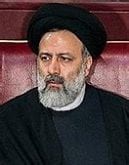Al-Arabia – Lebanese Foreign Minister Gebran Bassil has been accused of engaging in widespread acts of corruption, including receiving Iranian funds as payment for providing a “Christian cover” for Hezbollah.
The charges leveled by former justice minister Ashraf Rifi, who was also the general director of the Lebanese Internal Security Forces from 2005 to 2013, are certain to inflame political tensions in Beirut, as the Lebanese government struggles to tackle endemic corruption and implement fiscal reforms as a condition for unlocking more than $11 billion of foreign financial assistance to help alleviate Lebanon’s dire economic crisis.
In a news conference Monday in Rifi’s home city of Tripoli in north Lebanon, the former minister described Basil as the “most corrupt” minister in the government.
“Since the Free Patriotic Movement provided a Christian cover to Hezbollah’s weapons, Iran paid the FPM large sums of money periodically,” Rifi said, referring to the political party which Bassil heads. “This money was transferred to Lebanon in boxes that had ‘the Iranian Red Crescent’ written on them. Bassil personally received and transferred these cartons.”
Corruption has become a burning issue in Lebanon and is seen as a prime cause for the country’s ailing economy and fraught fiscal situation.
In April last year, donor countries and international lending institutions pledged some $11 billion in financial assistance to help Lebanon overcome the crisis. But the funds are contingent on a broad reform package that includes eradicating corruption.
The government has warned of the possibility of ushering in austerity measures to reduce the budget deficit, one of the highest in the world. The warnings have triggered protests from public sector employees who fear they will bear the brunt of any salary cutbacks.
Rifi, also a former head of the Internal Security Forces, warned against using Lebanon as a front under Iranian command, saying that the government must adhere to the UN Security Council Resolution 1701.
The former minister cited a controversial deal involving power-generating ships to support his claims of Bassil’s alleged corruption.
“Power costs are the main reason public debt increased. More than $36 billion out of $86 billion, which is the total sum of public debt, has been spent on power,” he said.
Rifi added that the cost of hiring the power-generating ships for the first five-year period between 2012 and 2017 was $755 million. As an example of the high cost of the temporary power solution, he said that the government spent $393 million on the ships for the first three years, but the cost of building two power plants in Zouq and Jiyeh only cost $350 million.
He also said that after the three-year contract ended, Bassil, in his capacity as then energy minister, renewed the contract for another two years despite the misgivings of the Central Inspection Board, which questioned the credibility of the Karadeniz Energy Group which owned the ships.
Rifi also questioned a massive drop in the price of a plot of land in Selaata in north Lebanon, where the ministry of energy plans to build a new power plant. The original asking price for the land was $200 million but the figure dropped to $30 million after an uproar.
Rifi said the price drop raised significant questions as to why the ministry was willing to spend $200 million in the first place for a plot of land that was subsequently valued at only $130 million.
The former minister also accused Bassil of buying property in the vicinity of future dams so he could extract high prices from the government if it wished to expropriate the property or benefit from an increase in value once the dam projects had been completed.
Rifi further charged Bassil with accepting payments from aspiring politicians who sought a place on his electoral list ahead of parliamentary elections, a practice in Lebanon that is widely believed to be followed by powerful politicians.
“One candidate paid Bassil $17 million,” Rifi said. “When this candidate did not win, he threatened to expose Bassil, so the latter returned a large percentage of this amount to avoid a scandal.”
He also claimed that some ministers in government as part of the FPM’s share paid Bassil a fee to gain a cabinet seat.
“A minister in the current government paid $10 million to be appointed as a minister. A current member of parliament acted as a mediator in this deal. This MP received $1 million, while Bassil received $9 million,” Rifi said.
In response, Bassil’s press office said that the minister had asked his lawyer to take the appropriate legal measures against Rifi for propagating “lies” that aim to harm his reputation.
“We will confirm to the public opinion through the [relevant] constitutional institutions that Rifi is not credible and that he always [relies] on lies and slander for the purpose of gaining popularity,” a statement issued by Bassil’s press office said.
Rifi took to Twitter later on Monday to counter-respond: “Your threats will not deter us from resuming the path of fighting corruption until the end.”
“We will not rest before facts are exposed via evidence. The looted public funds must be returned to the treasury,” he added.Last Update: Tuesday, 23 April 2019 KSA 20:45 – GMT 17:45
 Shabtabnews In this dark night, I have lost my way – Arise from a corner, oh you the star of guidance.
Shabtabnews In this dark night, I have lost my way – Arise from a corner, oh you the star of guidance.


